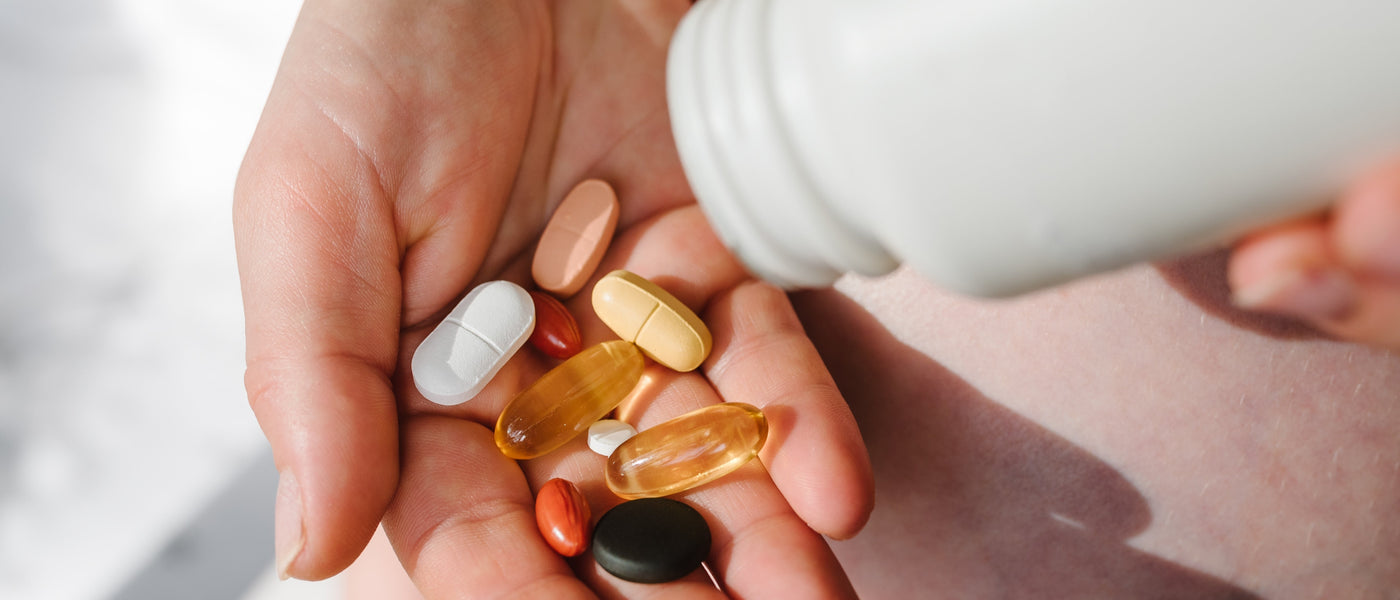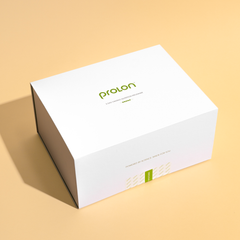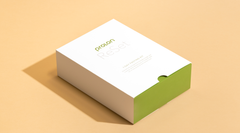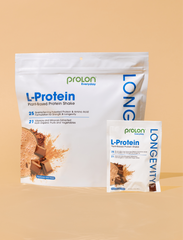
Can I Take Supplements While I’m on Prolon?
What supports your fast—and what could interfere with it
Key takeaways:
-
Fasting with Prolon isn’t just about cutting calories—it’s about avoiding nutrient signals that can interrupt cellular renewal.
-
Supplements like amino acids, collagen, creatine, melatonin, and certain vitamins can activate nutrient-sensing pathways and interfere with the fasting state.
-
Prolon already includes two carefully selected supplements—NR-1 and algal oil—to support you during the fast without disrupting its benefits.
-
Some caffeine-free herbs may be okay if they’re free of sugars, fillers, or additives.
-
To get the most out of your 5-Day, it’s best to avoid outside supplements and let your body take a break.
Fasting gives your body the space it needs to reset, renew, and repair. But while many people assume supplements are a harmless, or even helpful, addition to a fast, the truth is more nuanced. Fasting isn’t just about cutting calories; if that were the case, all non-caloric supplements would be fine. What truly defines a fasting state is not the absence of calories alone—it’s the absence of specific nutrient signals that tell the body food is available.
The Prolon Fasting Mimicking Diet (FMD) works by staying below those nutrient-sensing pathways (NSPs) to trigger autophagy, a process of cellular cleanup and rejuvenation linked to fat-focused weight loss with muscle protection, metabolic reset, longevity, and more. Autophagy typically requires about 72 hours without food or nutrients to activate, which can be difficult to achieve through traditional water fasting. That’s why Dr. Valter Longo and scientists at the USC Longevity Institute developed the FMD: a 5-day nutrition program that provides essential nourishment while keeping your body in a fasting state.
To keep your body in that fasting state, it’s important to stick exactly to the program and what’s in the Prolon box. However, you may still be wondering about taking specific supplements during the five days. Here’s what the science says about each, and whether it could break your fast.
What Supplements Are Included in the Prolon Program?
Every component of Prolon is scientifically formulated to avoid activating NSPs, while at the same time providing essential support for immune function, mitochondrial health, and cellular repair throughout the five days. That’s why Prolon includes two carefully selected supplements: algal oil, which delivers essential omega-3s to support brain and cardiovascular health, and NR-1, a vegetable-based powder with vitamins and minerals that helps meet your micronutrient needs. As such, adding outside supplements, even if they’re calorie-free, can interfere with your results, and additional supplementation isn’t necessary during Prolon.
“The supplements in Prolon weren’t chosen at random — they’re highly intentional. We wanted to ensure the program supports key processes like cellular repair, immune resilience, and mitochondrial function without breaking the fasting state. By filling in only the most essential nutritional gaps, we maintain the delicate balance that allows Prolon to mimic fasting while still supporting the body,” says Melanie Murphy Richter, MS, RDN “Adding outside supplements can tip that balance, which is why Prolon is designed to stand alone for those five days.”
IMPORTANT: While the FMD is scientifically designed to provide the essential nutrients your body needs throughout the five days, certain medical or nutritional supplements may still be necessary based on your individual health. If you take prescribed supplements, always consult with your healthcare provider before starting Prolon.
Supplements to avoid during your 5-Day program
Amino Acids and Collagen
Amino acids are the building blocks of protein. They act as powerful signals within your cells, activating NSPs like mTOR to trigger growth and protein synthesis, which takes the body out of its fasting state. This applies to all amino acids, including L-theanine, which some people take for stress or sleep support and should be avoided during the FMD cycle. Similarly, even though collagen is an incomplete protein, its amino acid composition can also activate mTOR and disrupt the fasting process.
Creatine
While not a protein, creatine is made from amino acids and helps produce ATP, which is like the battery that powers your cells. When ATP levels are high, your body gets the signal that there's plenty of energy available, even if you're not eating much. This can activate AMPK, another nutrient-sensing pathway, and trick the body into thinking it's well-fed - thereby shifting your body out of its fasting state.
Vitamin C
Even though vitamin C is calorie-free and water-soluble, it still sends signals that affect gene expression, redox balance (neutralizing free radicals and regenerating other antioxidants), and cellular metabolism. Vitamin C may also influence how your body senses nutrients, potentially taking it out of a fasting state.
B Vitamins (Especially B9, B12)
Some B vitamins support metabolic functions like DNA synthesis, methylation (adding a chemical tag to DNA to control gene activity), and fatty acid metabolism, all of which interact with NSPs. In general, these micronutrients may signal “nutrient abundance,” shifting your body out of fasting mode, and specifically, vitamin B12 and folate (also known as B9) support processes that tell your cells to grow, which can work against the body’s fasting and repair mode.
Vitamin D
Vitamin D is known to support bones and reduce inflammation, but it also affects how your body uses energy. It can signal the body to use calories for growth, like building muscle, which works against the fasting state. It also interacts with genes in ways that could interfere with the cellular changes your body is trying to make during a fast; for example, high-dose vitamin D (more than 4,000 IU per day) may disrupt the FMD’s support for muscle-protection and metabolic health.
Melatonin
Most often used for sleep support, melatonin can activate AMPK and other pathways that disrupt the fasting state. Additionally, it can affect insulin sensitivity and glucose metabolism, interfering with many of the FMD’s powerful metabolic benefits.
Omega 3’s (outside of what’s included in the kit)
Prolon’s FMD already includes algal oil capsules, formulated with the precise amount of essential omega-3s needed to help support cognitive and cardiovascular health while still staying under NSPs. Adding any other healthy fat or omega can push that balance over the line and take the body out of fasting mode.
Probiotics and Prebiotics
While these supplements typically contain no calories or digestible carbs or fats to activate NSPs, we recommend avoiding them during your five days. Prolon has been shown to support a healthy microbiome in preclinical (mice) studies, and to reap the true benefits of the 5-Day, it’s best to give your body a break to allow for this renewal.
“Our gut is the foundation of our health — it’s where the nutrients we consume are broken down, absorbed, and transformed into the raw materials that fuel every cell in our body. What’s remarkable about fasting with Prolon is that it doesn’t just give the gut a rest; it can help create an environment for renewal,” says Richter. “Preclinical (in mice) studies show that Prolon has the potential to reduce intestinal inflammation, stimulate regeneration, and encourage the growth of beneficial microbes like Lactobacillaceae and Bifidobacteriaceae. By pausing outside supplements during the 5-day program, you’re allowing this natural reset to take place - giving your digestive system the chance to recalibrate and come back stronger, more resilient, and better able to extract and deliver the nutrients your body depends on.”
Supplements that are generally OK during your 5-day program
The following supplements are generally acceptable during your FMD cycle and less likely to interfere with the fasting state or disrupt Prolon’s cellular benefits.
Electrolytes (Sodium, Potassium, Magnesium)
Staying hydrated during your 5-Day is key, and Prolon includes hydration support through herbal teas and the L-Drink. While we don’t recommend it, you can supplement with additional electrolytes if needed - as long as they are zero-calorie, unsweetened, and free of additives, sugars, flavors, or artificial ingredients so as not to trigger NSPs.
Herbal supplements
Several herbs (taken as tea, tincture, or capsule) may be safely enjoyed during your fast, as long as they’re caffeine-free and free from added fillers, sugars, or calories. Options like peppermint, hibiscus, ginger, turmeric, echinacea, and lemon balm offer supportive benefits without disrupting the fasting state.
What about Advil or Tylenol?
Headaches can sometimes occur during fasting, but they usually pass as your body adjusts. Staying hydrated and resting can help, but if you feel the need to take something, keep in mind that while aspirin, ibuprofen, or acetaminophen itself won’t break your fast, certain coatings and fillers might. Check the labels and watch for sugars (sucrose, dextrose, maltodextrin), flavors, starches, sugar alcohols (sorbitol, maltitol, glycerin), gelatin, or oils.
If you take supplements regularly, it can feel strange to stop for five days. But Prolon is carefully designed to provide everything your body needs to support natural cellular rejuvenation and renewal during that time. For these five days, give your body a real break, trust the science, and experience the reset Prolon was created for!
If you take medication or prescribed supplements, always consult with your healthcare provider before starting Prolon.
Sources:
Caristia, S., De Luca, E., & Grosso, G. (2024). Vitamin D and the hallmarks of aging: A review. Nutrients, 16(1), 180. https://pmc.ncbi.nlm.nih.gov/articles/PMC10975458
Efeyan, A., Comb, W. C., & Sabatini, D. M. (2015). Nutrient-sensing mechanisms and pathways. Nature, 517(7534), 302–310. https://doi.org/10.1038/nature14190
Examine.com. (n.d.). Echinacea – Research breakdown. https://examine.com/supplements/echinacea/research/
Jimenez-Ortega, V., Cano, P., & Cardinali, D. P. (2023). Melatonin and autophagy: Molecular interactions and clinical implications. International Journal of Molecular Sciences, 24(9), 8105. https://www.mdpi.com/1422-0067/24/9/8105]
Jewell, J. L., & Guan, K. L. (2017). Nutrient signaling to mTOR and cell growth. Trends in Biochemical Sciences, 42(2), 102–114.https://pmc.ncbi.nlm.nih.gov/articles/PMC5440210
Li, Y., & Schellhorn, H. E. (2022). New developments and novel therapeutic perspectives of vitamin C in cancer treatment. Antioxidants, 11(7),1280. https://pmc.ncbi.nlm.nih.gov/articles/PMC9261424
Moosavi, M., Hosseini, M., & Hadjighassem, M. (2020). The effects of vitamin B12 deficiency on gene expression in metabolic pathways. Journal of Molecular Neuroscience, 70(10), 1565–1578. https://pmc.ncbi.nlm.nih.gov/articles/PMC7551072
Righi, G., Grillo, G., & D’Aniello, C. (2023). The role of vitamin C in gene regulation and epigenetics. Cell Reports Methods, 3(8), 100413. https://www.sciencedirect.com/science/article/pii/S2213231723001544
Skov, A. R., Toubro, S., & Raben, A. (2019). Collagen supplementation and its role in muscle metabolism. Nutrients, 11(6), 1229. https://pmc.ncbi.nlm.nih.gov/articles/PMC6566836
Torrence, M. E., & Manning, B. D. (2017). Nutrient sensing in cancer: mTOR signaling and beyond. Current Opinion in Cell Biology, 45, 51–56. https://www.sciencedirect.com/science/article/pii/S135961011730076X
Zhang, Y., Han, Y., & Duan, J. (2024). Melatonin ameliorates obesity-related metabolic disorders through AMPK signaling pathways. International Journal of Molecular Sciences, 25(1), 174. https://pmc.ncbi.nlm.nih.gov/articles/PMC10969771
Zheng, Y., Lin, Y., Wu, J., et al. (2022). A multi-omics analysis reveals molecular alterations associated with vitamin B12 deficiency. Nature Communications, 13, Article 6277. https://pmc.ncbi.nlm.nih.gov/articles/PMC9321803]
Zhao, J., Li, M., & Ma, Y. (2024). The role of vitamin D in energy metabolism and nutrient sensing. Frontiers in Nutrition, 11, 1172892. https://pmc.ncbi.nlm.nih.gov/articles/PMC11100886]












